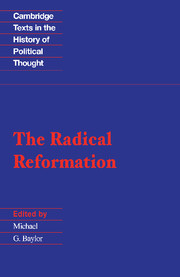
-
Select format
-
- Publisher:
- Cambridge University Press
- Publication date:
- June 2012
- October 1991
- ISBN:
- 9780511819353
- 9780521379489
- Dimensions:
- Weight & Pages:
- Dimensions:
- (216 x 138 mm)
- Weight & Pages:
- 0.52kg, 338 Pages
You may already have access via personal or institutional login
Book description
This 1991 book is a collection of writings by early Reformation radicals which illustrates both the diversity and the areas of agreement in their political thinking. The texts are drawn from the period 1521–7, centring on the German Peasants' War of 1524–6. The thinkers represented - Muntzer, Karlstadt, Grebel, Hut, Denck, and others - differed on important theological issues, yet all rejected the magistral reformation as serving the interests of society's elites. They advocated a strategy of Reformation from below, a sweeping transformation of society to the benefit of the lay commoner and the local community. With the start of the Peasants' War, radicals divided over the issue of the legitimacy of force. This division shaped the ways in which they confronted the failure of the Peasants' War and the alternate strategies for survival developed in its aftermath. Appended to the texts are a number of political programmes of the Peasants' War. These documents illustrate ways in which the radicals contributed to the uprising, and how the war itself led to greater clarity in the political theory of the radical Reformation.
Reviews
"We have here a very useful reader on the radical wing of the Protestant Reformation of the early sixteenth century....After a compact but informed introduction, a six-page chronology, and a concise bibliographical note, Professor Baylor presents in fresh translation thirteen key documents illustrating core concerns of the radicals." Donald F. Durnbaugh, Utopian Studies
Contents
Metrics
Altmetric attention score
Full text views
Full text views help Loading metrics...
Loading metrics...
* Views captured on Cambridge Core between #date#. This data will be updated every 24 hours.
Usage data cannot currently be displayed.
Accessibility standard: Unknown
Why this information is here
This section outlines the accessibility features of this content - including support for screen readers, full keyboard navigation and high-contrast display options. This may not be relevant for you.
Accessibility Information
Accessibility compliance for the PDF of this book is currently unknown and may be updated in the future.


